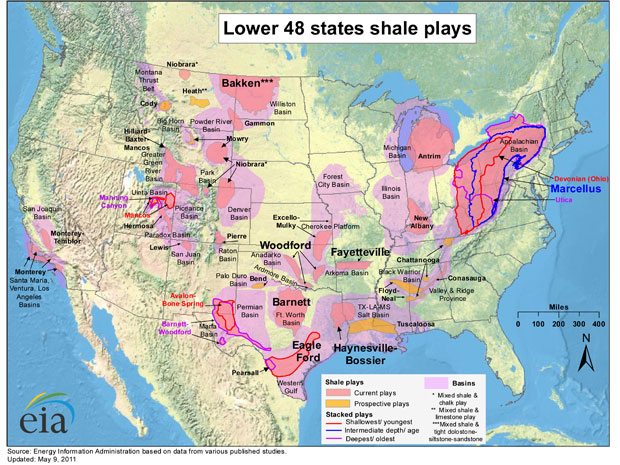The word “fracking” has been all over the media over the last few years. Hydraulic fracturing, or “fracking”, is the technical shorthand for the process that extracts natural gas and oil from deep inside the earth. Fracking* has facilitated a boom in natural gas drilling, but it also comes with many risks and disadvantages. These risks have caused concern among many foundations that now are funding efforts to regulate or ban fracking. Why should you pay attention?
1) It’s coming to a town near you. According to the U.S. Energy Information Administration there are currently 36 states with “shale plays” that are being fracked or explored for possible fracking. Most states are not on the sidelines of this serious industrial activity. Is your state in the mix?
2) Fracking is making people sick. While research has focused on the environmental impacts, it’s clear that there are public health impacts as well. The pollution of air and water in communities near fracking sites has been documented in both anecdotal stories and studies. What’s happening? Disproportionate levels of asthma, cancers, frequent headaches, and nosebleeds have been reported in fracking communities. Why? For starters, fracking is excluded from portions of the Federal Clean Air and Water Acts and host of other federal and state regulations. In the past, inadequate oversight of energy industries has not gone well (see Exxon Valdez Oil Spill and Deepwater Horizon Oil Spill). And as one public health expert writes, “there is no fence line community when it comes to fracking.” This industrial activity is occurring in residential areas without significant buffers to protect families from pollution.
3) It’s making communities sick too. There is growing evidence about the health and environmental impacts of fracking, but not enough people are talking about the other social impacts. With a sudden increase in drilling comes an influx of itinerant workers. Often, these workers live in small enclaves which locals call “man camps.” Many localities are seeing dramatic increases in violence, drunk driving, drug use, theft, housing shortages, and prostitution in, and near, towns with active fracking. Outrageous? Read about what happened in Williston, North Dakota after fracking began there.
4) Fracking is eroding town rights. The state legislature of Pennsylvania usurped the power of local municipalities to set the laws to regulate drilling when they passed Act 13. The law, which takes away the power of local townships to regulate or tax fracking, is currently being challenged in the State Supreme Court. Some Republicans and Democrats believe that these provisions violate the Pennsylvania constitution. And similar laws have been proposed in New York. To learn more about the specifics of the law read this summary by the National Resources Defense Council.
5) It’s eroding homeowner’s rights too. In order to gain access to shale from landowners not interested in leasing their property, gas companies have taken advantage of “split estate” laws which allows companies to purchase the mineral rights to land and drill without the homeowner’s permission. Split estate laws were mostly passed during the industrial boom of the late 19th century, but they are being used now in many states to facilitate gas drilling. (Sound unbelievable? Read the story of Vince and Jeanne Rhea in this recent Reuters article.)
6) Fracking could be worse for climate change than coal. Many environmentalists have supported the expansion of hydraulic fracturing based on the assumption that gas is a lower-carbon alternative to coal or oil. While burning natural gas as a fuel does produce less carbon dioxide than coal and oil, it also emits large amounts of methane. There is scientific consensus that methane is a more destructive greenhouse gas than carbon dioxide. A recent Cornell University study concludes that methane leakage from fracking sites has the potential to be twice as damaging as greenhouse gas emissions from coal. There is more research to be done on this topic but we know one thing for sure: calling natural gas clean is an overstatement.
7) Fracking could be what’s for dinner. Many of the fracking wells in states like Pennsylvania are located in rural areas that are dotted with farms producing fruits, vegetables, dairy products, and meat for the surrounding areas. Contamination of local water sources have been a major problem in gas-rich areas like Pennsylvania, Ohio, and Alberta, Canada. A 2012 Cornell University study linked fracking wastewater with mortality in farm animals. Many cases of cattle death in farms near fracking sites have been reported in Pennsylvania. One of the largest food co-ops in the country, located in Brooklyn, NYC, has publicly stated they will not order food products from New York farms that are near fracking sites, expressing great fear of contaminated products.
Funders who are concerned about the impacts of fracking on health, environments and communities are working together at the Health & Environmental Funders Network Hydrofracking Working Group. To learn more, contact Ramtin Arablouei. To learn more about fracking, check out HEFN’s briefing, Drilling Deeper.
*Advocates have adopted the term “fracking” to refer to the entire process of unconventional gas extraction from exploration to processing. We are similarly adopting the term for this article.

